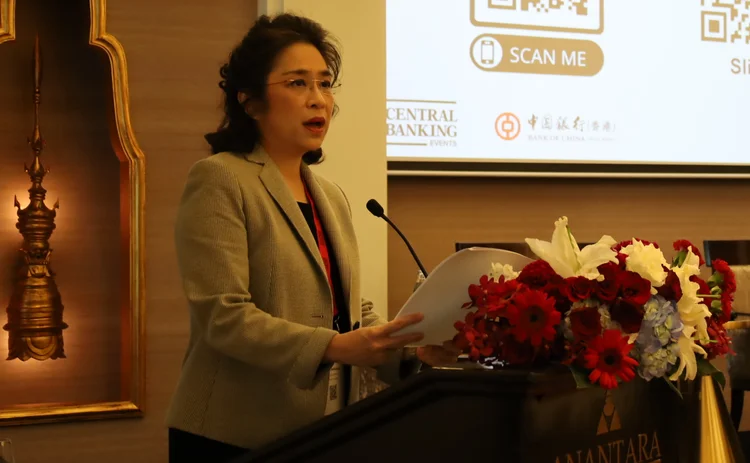
Innovate to tackle challenges, says BoT deputy governor
Mallikamas outlines ways to deal with economic and geopolitical uncertainties

Central banks from small and open economies should strengthen collaboration and embrace innovation to overcome new challenges in the changing economic and geopolitical environment, the deputy governor of the Bank of Thailand (BoT) has said.
In her keynote speech on July 24 during the Central Banking Asia Summit in Bangkok, Roong Mallikamas said policy-makers were facing challenges in delivering on their traditional mandates as well as in meeting the public’s expectations in emerging areas. Central Banking held the summit in collaboration with Bank of China.
She noted the global economy remains fragile. Countries are experiencing higher inflation, increased debt since the pandemic, and lower potential growth owing to falling birth rates and a shrinking working-age population.
The return of geopolitical tensions, she said, has led to increased trade restrictions and a reconfiguration of investment and supply chains. Increasing tariffs and reshoring could make central banks’ task of maintaining low inflation harder in the medium term.
However, she added that rapid development in digital technologies for payments, as well as advances in artificial intelligence (AI), could lead to opportunities as well as risks. These advances have increased international collaboration on areas such as cross-border payments, while exposing people to faster and more sophisticated fraud.
Mallikamas highlighted three key challenges facing central banks from small and open economies and emerging market economies and proposed ways to tackle them.
Increased economic uncertainty
The first challenge, she said, is that it has become harder for central banks to ensure macro-stability, given the limited area of policy over which they have control and the public’s higher expectations. This is partly due to lower economic growth, and the fact that inflation is increasingly driven by supply-side factors that lie beyond central banks’ control, such as geopolitical tensions and supply chain reconfiguration. Other trends, including technological developments and the green transition, are also likely to lead to large-scale adjustments in relative prices.
Mallikamas proposed a three-step approach to tackling this challenge. First, she argued that central banks should tailor monetary policy to their countries’ specific needs, with an awareness of its longer-term costs and side-effects.
Second, policy-makers should ensure co-ordination between monetary policy, macro-prudential measures and targeted financial policies in addressing issues such as higher household debt.
Third, policy-makers from a country’s government and its central bank should maintain good co-ordination between themselves. They should also ensure effective communication with the public, including gauging public sentiment.
New financial landscape
The second key challenge relates to how central banks can address legacy problems in the financial system, while supporting new financial services and business models as new technologies emerge. Mallikamas cited an example in Thailand, where small and medium-sized firms (SMEs) usually face much higher financing costs, partly because banks lack the data to appropriately assess the companies’ underlying risks.
“Resolving this will require new thinking on regulations, allowing new players with different business models to come into the market and better utilise data – while ensuring a level playing field,” she said. She added that more efficient financial solutions had the potential to lower financing costs for this underserved group.
Mallikamas cited the BoT’s plan to issue virtual bank licences to new market players. The goal, she said, is to allow new operators to provide better digital financial services for the under-served population and SMEs.
The deputy governor added that AI and online fraud have posed new risks to the financial system. Policy-makers, she said, should improve people’s financial literacy, as well as step up regulation and supervision. She also stressed the need for greater international collaboration in tackling cross-border fraud, including efforts to formulate international guidelines to facilitate data sharing or collaboration. “Without this co-operation, differing standards of domestic fraud will create the weakest link and make dealing with cross-border fraud much harder,” she said.
Geopolitical risks
The final challenge concerns how central banks might strengthen their financial systems’ resilience to the risks arising from increasing geopolitical tensions and new technologies. Mallikamas noted most central banks have learned the importance of exploring alternative infrastructure amid global economic uncertainty.
She pointed out that central banks in Asia have already formed partnerships to improve cross-border payments and facilitate the use of local currencies.
“Central banks play a role in ensuring that such infrastructure is open and inclusive enough – to help address rather than worsen financial inclusion at a national level, and to avoid creating further fragmentation at an international level,” she said.
She said the BoT had started linking its payment system with Japan in 2018 and currently has bilateral links with eight countries.
Under Project Nexus, the BoT and its regional peers are developing a standardised payment platform that could link up different countries’ faster payments systems. The goal is to create a platform that can serve as a global infrastructure, not just a closed-loop regional platform, Mallikamas said. The BoT is also a participant in Project mBridge, under which several central banks are building a central bank digital currency ledger for processing and settling cross-border payments.
Mallikamas said the BoT has been promoting a greater use of local currency for trade settlement, noting that 60% of Thailand’s cross-border trading activities occur within the Asian region. She added that local currency can also be an alternative settlement or payment option for local businesses when the US dollar is volatile.
Only users who have a paid subscription or are part of a corporate subscription are able to print or copy content.
To access these options, along with all other subscription benefits, please contact info@centralbanking.com or view our subscription options here: http://subscriptions.centralbanking.com/subscribe
You are currently unable to print this content. Please contact info@centralbanking.com to find out more.
You are currently unable to copy this content. Please contact info@centralbanking.com to find out more.
Copyright Infopro Digital Limited. All rights reserved.
As outlined in our terms and conditions, https://www.infopro-digital.com/terms-and-conditions/subscriptions/ (point 2.4), printing is limited to a single copy.
If you would like to purchase additional rights please email info@centralbanking.com
Copyright Infopro Digital Limited. All rights reserved.
You may share this content using our article tools. As outlined in our terms and conditions, https://www.infopro-digital.com/terms-and-conditions/subscriptions/ (clause 2.4), an Authorised User may only make one copy of the materials for their own personal use. You must also comply with the restrictions in clause 2.5.
If you would like to purchase additional rights please email info@centralbanking.com







